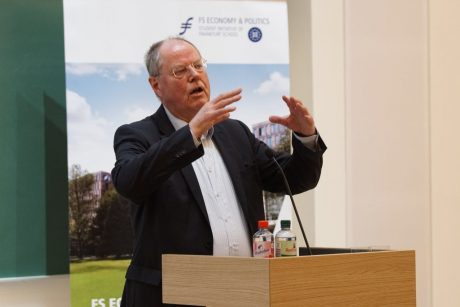On the 15th of November, the Frankfurt School Initiative FS Economy & Politics welcomed Peer Steinbrück, chancellor candidate of the SPD in 2013, former Federal Minister of Finance (2005-2009), as well as former Minister-President of North-Rhine Westphalia and current Senior Advisor of ING-DiBa.
Since the recession of 2008, many central banks, such as the European Central Bank (ECB), have decided to pursue a policy of low interest rates, which continues until today. Mario Draghi said the famous words „Whatever it Takes“ in 2012. The results of his speech were impressive. Speculations that Italy, for example, could run into major difficulties or that the monetary union is facing enormous problems have suddenly decreased. The markets calmed down.
In order to have a better understanding of this low interest policy, Peer Steinbrück was invited to give a speech at Frankfurt School of Finance & Management entitled: „Whatever it takes – Impact of low interest rate policy“. With more than 400 people attending, this was one of the biggest student organized events so far.

Peer Steinbrück
Mario Draghi saved the economy with his low interest rate policy five years ago, but there will be several critical consequences when the ECB will begin with the extraction of liquidity out of the economy. One impact are distribution effects in our society. The economy will decline if liquidity flows out of the market and interest rates will rise, so that investments (of companies or the state) will decrease. These effects will further impact capital, financial and labor markets, with the result, that all of us will notice the stepwise annulment of the low interest rate policy.
Furthermore, during the financial crisis, a number of “zombie banks” emerged. These banks had been provided with liquidity during the crisis, although otherwise they would have been insolvent. Moreover, these banks and also companies exploited their „too big to fail“ status to receive liquidity on an ongoing basis. During his speech, Peer Steinbrück was very reflective about his work as a Federal Minister of Finance, the statements he made and the party he belonged to.

Heads of FS Economy & Politics: Ekin Akkaya, Aurelia Auracher, Yannik Birkhahn, Tim Hartmann, Dennis Hübert, Katharina Stitzl
Finally, we would like to thank Mr. Steinbrück for visiting our university and the interesting thoughts he shared with us, as well as Frankfurt School for its support in organizing the event.
Co-author
Clara Heil is a Bachelor of Science student and member of FS Economy & Politics